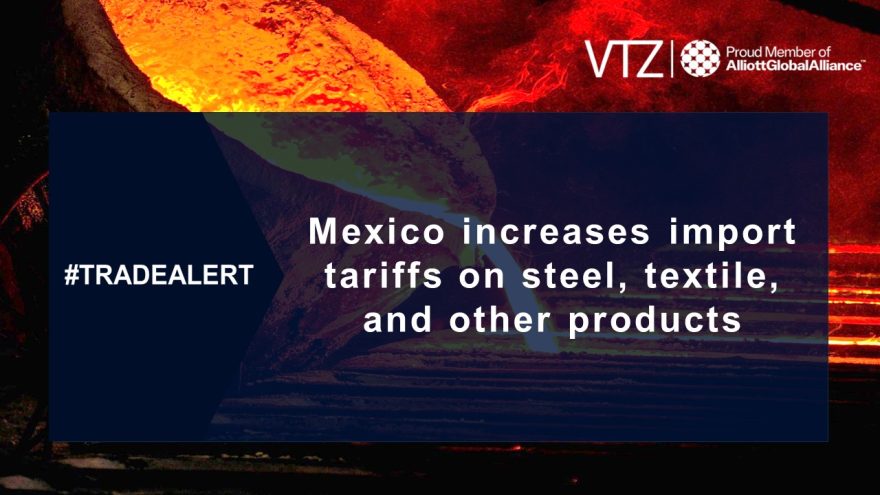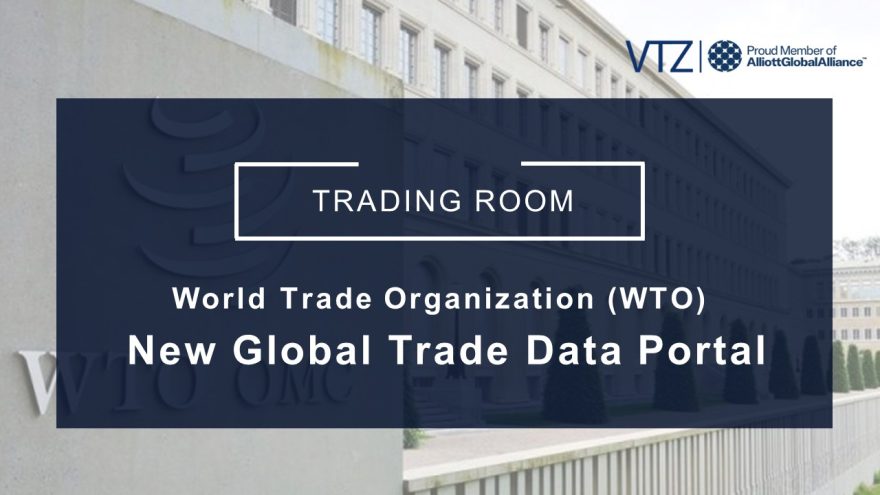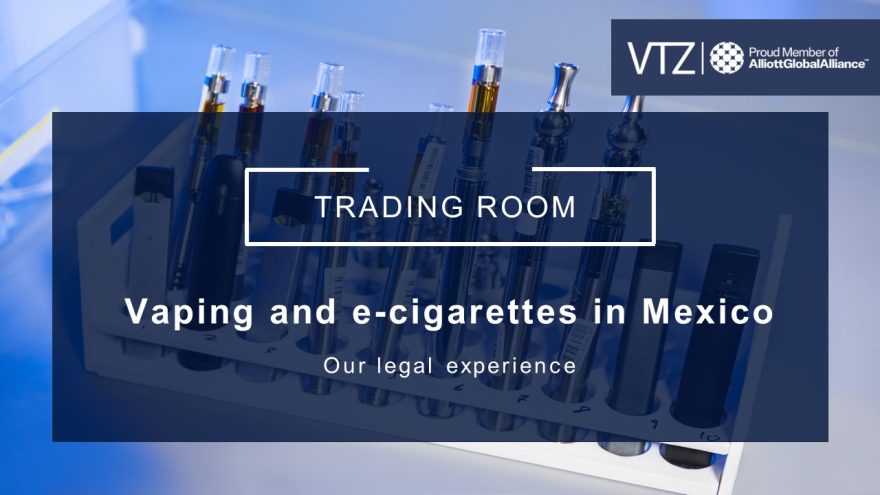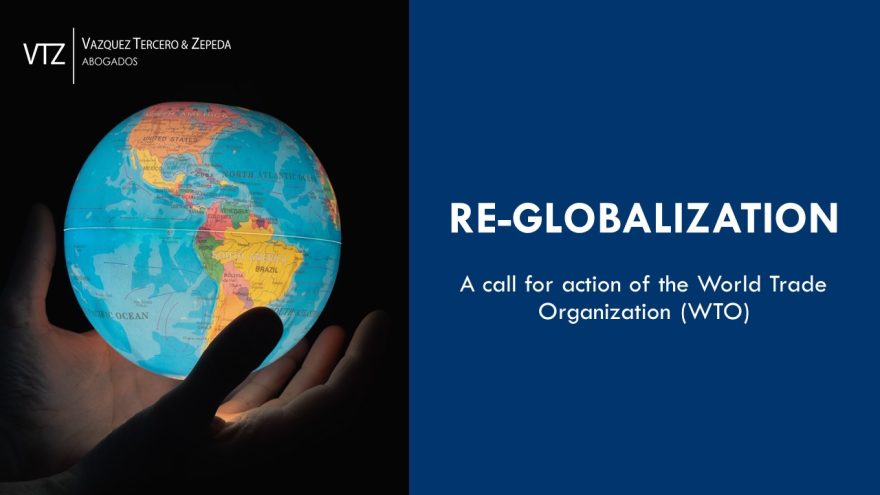Mexico increases tariffs on steel, textiles, and other products
On August 15, 2023, the President issued a Decree that increases import duties (MFN) to a wide spectrum of products. For clarity purposes, this Decree is not a safeguard measure, rather it is a trade measure taken within Mexico’s right within the WTO Agreement per its bound tariffs.
This decree has numerous economic, commercial, and political implications that will impact Mexico’s economy, domestic industry, importers, as well as exporters from countries without a Free Trade Agreement (FTA) with Mexico. Thus, VTZ shares this executive summary of the most important points of this tariff increase. VTZ is glad to share that this summary was quoted by U.S. Inside Trade.
What does this decree where Mexico increases tariffs consist of?
In general, the decree in which Mexico increases tariffs will impact the trade of hundreds of products. Specifically, the decree increases the import tariff applicable to 392 tariff items. Virtually all products in these tariff items are now subject to a 25% import tariff, except for certain textiles that will be subject to a 15% tariff.
The Decree impacts the following products: Steel, aluminum, bamboo, rubber, chemicals, oils, soap, paper, cardboard, ceramic products, glass, electrical equipment, musical instruments, and furniture. This modification may have diverse effects on the national economy. We also note that the decree will impact trade relations and the flow of goods between Mexico and its non-FTA trading partners, such as Brazil*, China, South Korea, Taiwan and India will be the most affected.
Mexico imposes temporary tariffs for the importation of merchandisehttps://t.co/qyE1NpBB7f
— Jaun News Usa (@jaunnewsusa) August 16, 2023
By increasing tariffs, the Decree evidently increases the prices of imported products, which translates into higher final prices for industrial or final consumers. Simultaneously, higher tariffs can provide «protection» to domestic industries from foreign competition.
More “protectionism” for products with antidumping duties or subject to anti-dumping investigations?
VTZ points out that there are certain industries that will particularly «benefit» from this decree that increases import duties. Specifically, we are referring to products that are subject to an active anti-dumping investigation in Mexico or products that are already subject to antidumping duties. On the one hand, the Ministry of Economy is currently investigating imports of steel balls from China, tires from China, and is also conducting a sunset and administrative review of countervailing duties on seamless steel pipe from Korea (and other origins). All of these products are listed in this decree that increases tariffs.
Mexico raises import tariffs https://t.co/CwN1zGdaDl pic.twitter.com/tG0sIrCrbh
— OPPORTIMES (@opportimes) August 16, 2023
Regarding products listed in the Decree with antidumping duties, we highlight that the imports of stainless steel from China and Taiwan, cold-rolled sheet from Korea, cold-rolled sheet from China, coated flat steel from China and Taiwan, seamless steel pipe from Korea, India and Ukraine, among others, will suffer the effects of this increase in tariffs.
Which companies and countries will be affected by the tariff increase?
An important point about this tariff increase is that it will impact all products, except those originating from countries with which Mexico has a free trade agreement (FTA). In other words, goods originating from the United States, Canada, the European Union, Vietnam, Japan, Singapore, among others, will not have to pay this MFN tariff, as long as they have their certificate of origin. Products from these origins will continue to benefit from the preferential tariff provided in the FTA. In addition, it is noteworthy that certain modified tariffs could impact the activities of companies under the PROSEC program. This modification to the import tariff rate became effective on August 16th, 2023, and will end on July 31st, 2025, i.e. practically two years.
Why did Mexico decide to increase its tariffs?
In the decree, the President explains two main reasons. On the one hand, the President points out that there is currently a global overcapacity in steel production, which puts pressures to place the steel surplus in markets. On the other hand, the Decree mentions that the textile, apparel, and footwear industry has been affected by COVID and the slowdown in economic growth. It is also noteworthy that the Mexican pesos (MXN) – U.S. Dollars (USD) exchange rate may be another factor pondered in this tariff increase.
Consequently, the President considered that this tariff increase was necessary to provide certainty and fair market conditions to all sectors facing vulnerable situations, to allow the recovery of the industry, to promote its development and to support the domestic market.
Conclusion
In conclusion, the decree that increases tariffs has a direct impact on the prices of imported products, which may influence industrial and final consumers. Although this decree is not a safeguard measure, the increase in import duties responds to the alleged need to address specific challenges faced by certain industrial sectors.
This type of measure highlights the importance of having sources of supply from countries with free trade agreements. Furthermore, IMMEX companies will have to take special care with the control of their inventories of temporary imports and their compliance with the rules of deferral of tariffs of non-originating goods article 2.5 of the USMCA.
Evidently, foreign exporters and Mexican importers should consider this tariff increase for their current and future business in Mexico. In case you need advice or to explore other alternatives, please do not hesitate to contact our VTZ team.
Need more information?

Adrián Vázquez
Managing Partner

Eduardo Zepeda
Partner

Emilio Arteaga
Jr. Partner

Verónica Vázquez
Partner

Gilberto Mejía
Associate








